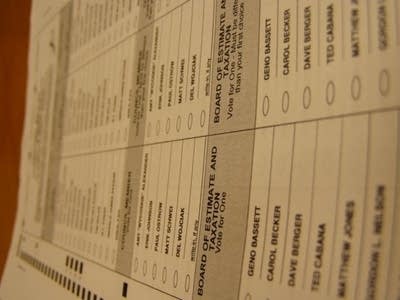Minneapolis begins work on multiple choice voting system

Minneapolis voters have overwhelmingly approved a change to the city's charter that provides for instant runoff voting. Supporters say it will make for more, small 'd' democratic elections.
City elections director Cynthia Reichart says IRV allows voters to rank their choices of candidates in city elections.
"Basically if you go in and make your first choice, you can rank a second choice candidate, a third choice candidate," she says. "When those votes are tallied, if the first choice votes do not reach 50 percent for any one candidate, the candidate with the least number of votes is dropped off the ballot. The second choice votes on those ballots are re-distributed back to the field of active candidates. And that process continues until there is somebody who receives more than 50 percent."
Reichart says it hasn't been determined exactly how many choices voters will be able to make. In some cities, she says, voters can rank all the candidates running in a race. The process becomes multiplied when applied to multiple seat races, like those for the library board and park board where voters are picking three and four candidates at a time.
Create a More Connected Minnesota
MPR News is your trusted resource for the news you need. With your support, MPR News brings accessible, courageous journalism and authentic conversation to everyone - free of paywalls and barriers. Your gift makes a difference.

Reichart says it will likely take longer for Minneapolis voters to learn who they've elected.
"San Francisco uses this method and this past election, the election was held on Tuesday -- their final results came in sometime over the following weekend," she says.
In San Francisco, the prefered term is "ranked choice voting". There's nothing really instant about it.
"San Francisco has used ranked choice voting since -- the first election we used it in was November 2004," says John Arntz, elections director for the city of San Francisco.
In San Francisco's races for city supervisor, the equivalent of city councilmembers, the outcome was close, and required recounts. That's why it took several days to get election results.
Arntz says despite the delays, the process has gone smoothly and has even gotten more people to the polls. But he says the transformation requires a great deal of coordination among the city and other governmental agencies and between the city and the vendor who supplies the balloting machines and software.
Arntz says Minneapolis will also need to put money into voter education. He says he's seen more voters in San Francisco not utilizing their full three choices on the ballots. Arntz says that can actually affect the outcome of a close race.

"The second and third choices do have an effect," he says. "Because like in that one district, once we get done counting the cards we'll do the final tally. We'll apply the ranked choice method and the second and third choices will determine who wins that contest."
The new voting method has broad support among Minneapolis city councilmembers including Betsy Hodges.
"The thing I like most about it, is that it deepens democracy," says Hodges.
Hodges says IRV encourages candidates to run more positive campaigns. She says that's because candidate A will want to be marked as the second choice of a voter who may chose candidate B. So candidate A will not want to go negative and alienate Candidate B's supporters.
Hodges also says that by voting their preference, voters can send a message to major party candidates about what matters most to them.
"It means that on the second ballot, (you know) who who didn't make it through the first ballot. You know where their votes went. And that gives more leverage to these minor party voices."
However some say IRV will have the opposite effect on minor parties. Earlier this week governor Tim Pawlenty told Minnesota Public Radio News he opposes ranked choice voting because it would concentrate power with the Republican and DFL parties. A group called Minnesota Voters Alliance is threatening to sue the city to prevent it from using IRV.
The city is aiming to implement the new system in 2009. If the process hits a significant snag, the city may wait until 2013 before conducting it's first ranked choice election.
